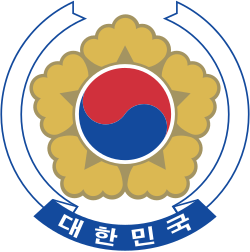Draft:Portal:Politics of South Korea
Portal maintenance status: (No date set)
|
| Main | Topics and categories | Tasks and projects |
The politics of South Korea portal
The politics of South Korea take place in the framework of a presidential representative democratic republic, whereby the president is the head of state, and of a multi-party system. To ensure a separation of powers, the Republic of Korea Government is made up of three branches: legislative, executive, and judicial. The government exercises executive power, and legislative power is vested in both the government and the National Assembly. The judiciary is independent of the executive and the legislature and comprises a Supreme Court, appellate courts, and a Constitutional Court.
Since 1948, the constitution has undergone five major revisions, each signifying a new republic. The current Sixth Republic began with the last major constitutional revision that took effect in 1988. From its founding until the June Democratic Struggle, the South Korean political system operated under a military authoritarian regime, with the freedom of assembly, association, expression, press and religion as well as civil society activism being tightly restricted. During that period, there were no freely elected national leaders, political opposition is suppressed, dissent was not permitted and civil rights were curtailed.
The Economist Intelligence Unit rated South Korea a "full democracy" in 2022.[1][needs update] According to the V-Dem Democracy indices in 2023, South Korea was the third most electoral democratic country in Asia. South Korea is often cited as a model of democracy due to its relatively peaceful and internally-driven democratic transition.
However, the mid-2000s to mid-2010s are often considered South Korea's backsliding period. Although, some have argued South Korea has hit a democratic ceiling and changes are more characteristic of democratic stagnation in lieu of regression. This took the form of more state involvement (particularly through the Korea Communications Commission or KCC) in media control and less editorial independence among journalists with conservative media owners.
Overall, political expression lagged behind comparable democracies. Additionally, South Korea has very strict election and campaign finance regulations, that includes no door-to-door canvassing and, consequently, some have cited these regulations as barriers to political expression and free and fair elections. These changes have largely attributed to South Korea's weak political party structure that emphasizes leaders and, consequently, hyper-presidentialism. Moreover, a right-left ideological divide has been more deeply entrenched into South Korean political society. However, South Korea is considered to have a strong civil society or simin sahoe manifested through a large number of civic organizations that prevented further backsliding via the 2016-2017 Candlelight Demonstrations. South Korea was also plagued by strong regionalism, dating back to the Silla-Balhae rivalry.
Under more recent administrations such as President Yoon Suk Yeol, South Korea has taken a stance as a "Global Pivotal State," which involves a greater role in East Asia as a democratic power. Despite its own democratic struggles, South Korea has taken an active role on democracy on the global stage having hosted the 2024 Summit for Democracy and committing to "strengthen coordination on promoting democracy and protecting human rights" at the 2023 Camp David Summit with the U.S. and Japan, bolstering their trilateral relationship. (Full article...)
Selected article
The April Revolution of 1960 was a pivotal pro-democracy movement in South Korea that led to the resignation of President Syngman Rhee and the establishment of the Second Republic. The revolution was primarily driven by public outrage over authoritarian rule, corruption, and electoral fraud during Rhee's extended presidency. The movement began with student and labor protests in the city of Masan, sparked by the discovery of the body of a student, Kim Ju-Yul, who had been killed during earlier demonstrations. This incident ignited national anger and drew attention to government brutality. On April 19, the protests escalated in Seoul, where more than 100,000 students marched toward the Blue House, the presidential residence. Police opened fire on the demonstrators, resulting in approximately 180 deaths and numerous injuries, which further fueled public outrage. As the demonstrations grew, they garnered broader support, including professors and citizens. The immense pressure ultimately forced Syngman Rhee to resign on April 26, 1960, after which he fled to exile in the United States. Following Rhee's departure, Yun Posun was elected as president, marking the beginning of the Second Republic of Korea and a transition to a more democratic political system.
Featured picture
The page "Draft:Portal:Politics of South Korea/Featured picture/13" does not exist.
Selected quote
The page "Draft:Portal:Politics of South Korea/Selected quote/7" does not exist.
Selected biography
Lee Jae-myung is a South Korean politician and lawyer, born in 1963 in Andong. Overcoming a challenging childhood marked by poverty and industrial injuries, he pursued education through equivalency exams and earned a law degree from Chung-Ang University in 1986. Inspired by figures like Roh Moo-hyun, he became a human rights and labor lawyer, actively engaging in civic movements in Seongnam. Entering politics in 2005, Lee served as Mayor of Seongnam (2010–2018) and Governor of Gyeonggi Province (2018–2021). His tenure as governor was noted for proactive COVID-19 measures, including mandating testing for all foreign workers in the province. In 2022, he was elected to the National Assembly of South Korea representing Gyeyang B in Incheon. Lee ran for president in 2017 and 2022, narrowly losing the latter to Yoon Suk Yeol. In January 2024, he survived an assassination attempt during a public event in Busan. Later that year, amid a national crisis following President Yoon's declaration of martial law, Lee gained attention for livestreaming his protest by climbing the National Assembly fence. He played a significant role in leading the impeachment proceedings against Yoon, culminating in Yoon's removal from office in April 2025. Subsequently, Lee resigned as party leader and announced his candidacy for the 2025 presidential election, securing the Democratic Party of Korea's nomination later that month.
Did you know (auto-generated) -

- ... that in his first month in the job, Wali Mohammad Itoo suspended all 23 opposition representatives when they questioned his integrity as the speaker of the Jammu and Kashmir Legislative Assembly?
- ... that Romanian adventure novelist N. D. Popescu-Popnedea "generate[d] laughter" with his deposition at a political assassin's trial?
- ... that the founder of a Mississippi radio station compared selling advertising time to campaigning for political office?
- ... that What Hath God Wrought, the 2007 history of Jacksonian America written by Daniel Walker Howe, is dedicated to Andrew Jackson's "political nemesis" John Quincy Adams?
- ... that after being arrested for organizing a general strike in 1920, S. Girinis was sent to the Soviet Union following a Soviet-Lithuanian exchange of political prisoners?
- ... that Ye Gongchuo worked for emperors, warlords and republicans before leaving politics to focus on art?
More did you know...
In this month
News and Current events
Topics and categories
General images
Related portals
Associated Wikimedia
The following Wikimedia Foundation sister projects provide more on this subject:
-
Commons
Free media repository -
Wikibooks
Free textbooks and manuals -
Wikidata
Free knowledge base -
Wikinews
Free-content news -
Wikiquote
Collection of quotations -
Wikisource
Free-content library -
Wikiversity
Free learning tools -
Wiktionary
Dictionary and thesaurus
Sources
- ^ Democracy Index 2023: Age of Conflict (PDF). Economist Intelligence Unit (Report). 2024. Archived (PDF) from the original on 2024-06-09. Retrieved 2024-07-22.





















































